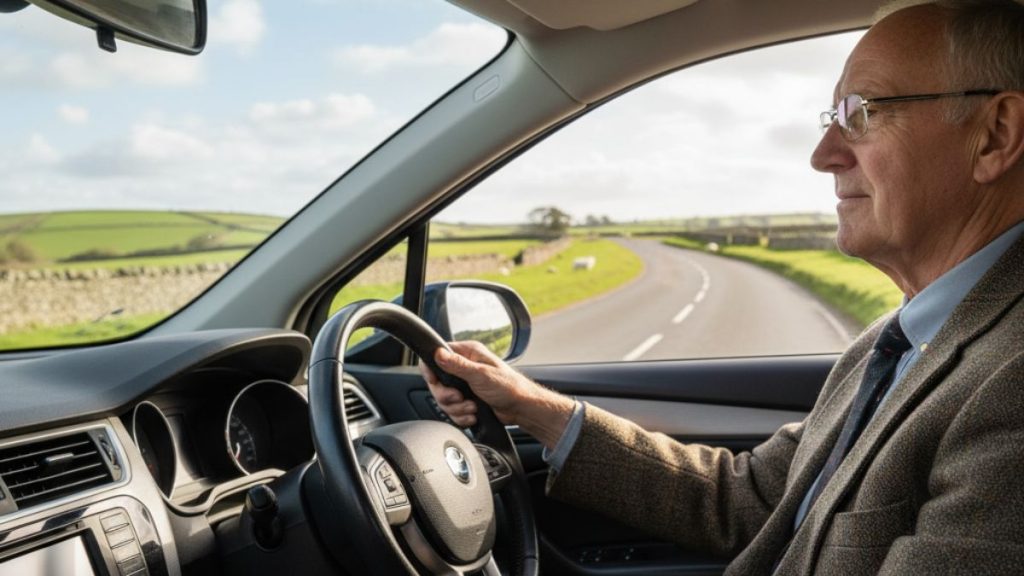The UK Government has officially rolled out sweeping new driving laws on 22 October 2025, bringing significant changes for motorists aged 57 and above. The reforms — which include mandatory health declarations, vision tests, and updated licence renewal procedures — are among the most substantial updates to driving regulations in over a decade.
The move, confirmed by the Department for Transport (DfT) and the Driver and Vehicle Licensing Agency (DVLA), aims to strike a balance between road safety and mobility freedom for older drivers.
While officials insist the measures are designed to “protect lives, not penalise experience,” the announcement has generated debate among senior motorists, with some welcoming the focus on safety and others expressing concern about bureaucracy and costs.
Why the Law Is Changing
Government data shows a gradual increase in age-related medical incidents among drivers in their late fifties and beyond. These include slower reaction times, vision impairment, and fatigue-related accidents.
While the majority of senior drivers maintain excellent safety records, the DVLA argues that regular medical and vision checks will help detect early health concerns and prevent avoidable accidents.
“We value the experience of Britain’s older drivers, but road safety must evolve with public health realities,” said Sarah Edwards, Minister for Transport. “These reforms ensure drivers stay fit, alert, and confident behind the wheel — for their safety and everyone else’s.”
The DfT’s studies also found that drivers who undergo routine health screenings are less likely to be involved in accidents due to underlying conditions.
What the New Rules Mean for Drivers Over 57
Beginning 22 October 2025, motorists aged 57 and older must comply with new DVLA requirements for maintaining a valid driving licence.
These include:
1. More Frequent Licence Renewals
Previously, most drivers renewed their licences every 10 years. Under the new rule, motorists aged 57 and above must now renew every 3 years.
This update aims to ensure more up-to-date health information and reduce risks linked to undiagnosed medical conditions.
2. Mandatory Health and Fitness Declarations
All drivers in this age group will be required to complete a Driver Fitness Self-Assessment Form every three years.
This digital or paper form includes questions on:
- Medication and prescription drug use
- Chronic illnesses (e.g. diabetes, heart disease, neurological disorders)
- Eye conditions or vision loss
- Mental health or cognitive changes affecting driving
The new form will also integrate with NHS systems, allowing GP-verified digital submissions for quicker processing and medical accuracy.
3. Official Vision Tests from Certified Optometrists
Perhaps the most talked-about reform is the mandatory vision test requirement for drivers aged 57 and above.
To renew a driving licence, applicants must now present a valid eye test certificate issued within the last 12 months by a DVLA-approved optometrist.
Failure to meet the minimum eyesight standard — being able to read a number plate from 20 metres away — could lead to licence suspension until corrective measures are taken.
Vision deterioration is one of the most common age-related conditions affecting road safety, and officials believe annual tests will significantly reduce collision risks.
4. Medical Condition Reviews
Drivers diagnosed with conditions such as diabetes, heart disease, epilepsy, or Parkinson’s disease will now be subject to biennial (every two years) medical reviews instead of three-year intervals.
The aim is to maintain closer monitoring of those who may face higher risks while allowing medically fit drivers to continue driving with confidence.
5. Automated Renewal Reminders
To help drivers stay compliant, the DVLA will automatically issue digital renewal reminders via email and post 90 days before licence expiry.
Renewal applications will only be approved once the driver has submitted:
- The updated health self-assessment form
- Proof of a recent vision test
- The £14 renewal fee (for online applications)
Processing will take an estimated 7–10 working days, and confirmation will be sent by email or letter.
Drivers who fail to renew before their licence expires could face fines of up to £1,000 and invalid insurance coverage.
The Impact on Senior Drivers
These reforms are designed to create a culture of proactive safety without unfairly restricting senior drivers’ independence.
Benefits include:
- Early detection of health problems affecting driving ability.
- Greater public safety and reduced accident risks.
- More confidence for drivers and reassurance for families.
However, some older drivers argue that the process introduces extra costs and administrative hurdles. Critics say that healthy, long-term motorists with spotless records should have a simplified renewal path.
“Not every older driver poses a higher risk,” said a spokesperson for the National Pensioners Convention (NPC). “There should be flexibility for those with a strong driving history and no medical concerns.”
The DfT has promised to review public feedback over the next two years and adjust requirements if needed.
How to Renew Your Licence Under the New System
Renewing your licence under the 2025 rules will be simple if you follow the updated steps:
- Log in to the DVLA website using your Government Gateway ID.
- Complete the updated Driver Fitness Form, declaring any health or medical conditions.
- Upload a valid vision test report from a licensed optometrist dated within the past 12 months.
- Pay the £14 online renewal fee securely.
- Wait for digital or postal confirmation (usually within 10 working days).
For those who prefer paper forms, the DVLA will continue offering postal renewal options, though processing times may be slightly longer.
Penalties for Non-Compliance
Failing to renew your licence or skipping the required health declaration could result in:
- Invalid insurance coverage
- A £1,000 fine
- Potential driving suspension until documentation is updated
Insurance providers will have access to DVLA compliance data, and claims could be denied if a driver’s renewal or health verification is found invalid at the time of an incident.
Insurance Industry Response
Insurance companies have welcomed the rule changes, citing them as a positive step toward reducing claims related to medical emergencies on the road.
Insurers are expected to:
- Offer discounts to drivers who maintain updated medical and vision records.
- Require proof of compliance when renewing policies.
- Integrate automated data checks with the DVLA for faster policy validation.
Analysts believe that the new regulations will gradually shift risk assessments, rewarding responsible drivers while penalising non-compliance.
Government’s Official Position
In a statement released on 22 October 2025, the Department for Transport reaffirmed its commitment to fairness and public safety:
“Our goal is not to restrict driving but to ensure that health, safety, and independence go hand in hand. Experienced drivers are vital to our road network, and these new checks will give them the tools to stay behind the wheel safely for longer.”
Officials also confirmed support measures for rural drivers who rely heavily on personal vehicles due to limited public transport options.
Concerns Raised by Advocacy Groups
Advocacy organisations have urged the government to ensure clear communication and accessible systems, especially for seniors with limited internet literacy.
Groups like Age UK and IAM RoadSmart have called for:
- Free or subsidised eye tests for pensioners.
- Community outreach programmes to help with digital renewals.
- Flexibility for individuals with long-term clean driving records.
They argue that while the policy strengthens safety, it must not inadvertently isolate older citizens or remove their mobility too quickly.
Future Implications and Review Plans
The government plans to monitor feedback and accident data over the next two years, with a full policy review scheduled for 2027.
Potential adjustments could include:
- Extending renewal intervals for drivers with no health risks.
- Offering digital “driver fitness dashboards” linked to NHS records.
- Introducing incentives for safe driving among older motorists.
This evolving policy reflects the UK’s broader commitment to building safer, more inclusive roads while respecting the independence of ageing populations.
Steps to Stay Road-Ready After 57
Experts recommend that older drivers adopt simple habits to stay compliant and confident:
- Schedule annual eye and health checks.
- Keep emergency contact and medication details updated with your GP.
- Use assistive driving features in newer cars (lane sensors, blind-spot alerts, adaptive headlights).
- Avoid driving long distances or in low visibility if fatigued.
The Road Ahead: Safety and Freedom in Balance
The 2025 driving reforms mark a pivotal shift in UK transport policy — one that recognises both the value of experience and the need for modern safety standards.
While the system introduces more checks, it also empowers drivers to maintain independence responsibly, ensuring that living longer doesn’t mean losing the right to drive.
As Transport Minister Sarah Edwards concluded:
“Driving is not just about mobility — it’s about independence, dignity, and confidence. Our mission is to help older drivers keep all three safely.”
Summary Table: New Driving Rules for Drivers 57 and Older
| Aspect | Details Effective 22 Oct 2025 |
|---|---|
| Renewal Frequency | Every 3 years (previously 10) |
| Health Declarations | Mandatory self-assessment of fitness, medication, and illnesses |
| Vision Test | Required every renewal; must be from certified optometrist |
| Medical Reviews | Every 2 years for high-risk conditions |
| Renewal Fee | £14 (online) |
| Penalty for Non-Compliance | £1,000 fine, possible licence suspension |
| Insurance Impact | Invalid coverage if not compliant |
Frequently Asked Questions (FAQs)
1. Who needs to follow these new driving rules?
All UK drivers aged 57 or older renewing their licence on or after 22 October 2025 must follow the updated process.
2. Do I have to take a driving test again?
No. You only need to complete health and vision assessments unless the DVLA identifies major medical risks.
3. How often must I renew my licence now?
Every 3 years after age 57. At 70, renewals remain every 3 years, as before.
4. Will this affect my insurance?
Yes. Non-compliance can invalidate your insurance policy, while verified medical and vision records may reduce premiums.
5. Can I still renew by post instead of online?
Yes. Paper renewals are available for those uncomfortable with digital submissions, though they may take longer to process.
























